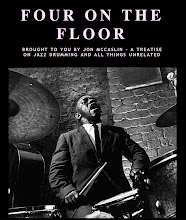
I've been in the middle of several interesting e.mail exchanges lately with my DMA colleagues Tom Van Seters & Patrick Boyle and future U of T jazz professor emeritus Paul Read about the role and validity of using a metronome in one's practice routine. I was also intrigued by a couple of other posts that have popped up on my jazz blog radar regarding the use of a metronome (or not!)
Check out some interesting discussion at Dave Douglas' blog here where he answers some questions originally put forth by bassist Jeff Berlin on the topic of using a metronome:
http://greenleafmusic.com/blog/2009/12/from-the-mail-bin-jeff-berlin-and-the-metronome.php
Also, another nice follow up commentary on the same topic by pianist Ethan Iverson of the Bad Plus here:
http://thebadplus.typepad.com/dothemath/2009/12/metronome-mythologies.html
A quote that really cracked me up here was:
"about the time that someone gave Oscar Peterson a drum machine to play with. After a week of fooling around with it, Peterson reported back, “This is fun, but it drags.”
HA !!!
Interesting. I obviously can't really deny that Peterson swings like MAD so who cares if he speeds up and couldn't match the click. What does this tell us about playing with a metronome ?
I am very interested in the Metronome Debate and in different musicians opinions that exist in regards to whether or not practicing to a metronome really benefits his or her Time and/or Time Feel.
*I'll begin by stating that I don't think these two elements, Time & Time Feel, are necessarily one and the same !*
(more on that later)
Some musicians feel that playing with a metronome doesn't really help you at all (see Jeff Berlin's letter to Dave Douglas) yet
others think that it's an invaluable tool to developing your sense of Time. I always relish at the opportunity to sit down with Montreal trumpeter and McGill professor Kevin Dean to hear about his philosophy regarding Time and how he uses a metronome in practice. After you listen to him preach, you'd swear there was no other way !
One thing is for sure though, GREAT musicians consider having great Time a priority (almost to the point of being like a religion) and not something to be taken lightly.
However, how the metronome plays into that equation is still up to debate.
So here are some questions I'd like to address in this blog over the course of the next while and I would certainly appreciate any feedback from anyone out there who is reading this and cares : )
- Are metronomes useful tools for developing ones' sense of time ?
- Why or why not ?
- If Yes, what different ways can you use a metronome to practice ?
- If No, what tools or approach do you use instead to develop your sense of Time ?
Yes, folks - Time is not just a magazine !
To be continued...




















hey man, cool blog. I stumbled over here doing some homework on Frankie Dunlop, and found your post about him.
ReplyDeleteI'm a drummer. I practice with a metronome (actually a drum machine) almost 100% of the time. It makes my personal time better.
How so? Because it gives me constant feedback about the accuracy of my own, internal sense of time.
In short, it helps me learn to **hear** the time.
To me, playing in time is like playing in tune. You can bend notes, play flat or sharp on purpose, but it's only cool *if it's on purpose*, and not because you're not hearing that you're flat or sharp.
You can speed up, slow down, be on top or behind the time, but you have to understand that that is what you're doing, and it has to be in the service of the music.
Not just because you don't happen to notice or hear that you're on top, or behind, or speeding up, or slowing down.